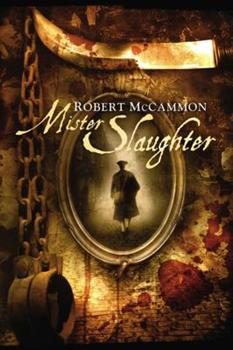By chance I recently bought a copy of Robert R. McCammon’s novel, Mister Slaughter. This is the third book in his Matthew Corbett series, each set between 1699 and 1705 in Colonial America and England (plus one island somewhere in the Caribbean), with additional settings promised at the end of the seventh book in the series.

Although I lack the 2nd, 5th, and 6th books in this series, much of each novel can be read as standalone books. Sure, there’s a common thread through all of them, save the first one, as Corbett gains a nemesis in the evil Professor Fell starting with The Queen of Bedlam. But, each one more or less has their own set of adventures, although they all lead onward to the next book, and bear traces from previous ones.
As Mister Slaughter commences, there’s a brief mention of events in the previous book, The Queen of Bedlam. Not having read that one, I took on faith that something happened, and that Corbett, young and naive at age 24, is still affected by those events, and is still learning about the world. He has a young woman who cares for him, but he’s too shy or cautious to reciprocate (this is what I call the the “Spider-Man thwarted love” trope, where the hero cannot have a real relationship, as his adversaries will use this against him). He has a friend and mentor, Hudson Greathouse, but he’s too stubborn to accept help and advice from the older, more seasoned man. Still, as the novel must have a plot, they both are hired to escort a dangerous criminal from an asylum to a ship, for transport to England to stand trial.
Tyranthus Slaughter, with a name straight out of George Lucas’s Star Wars, is a killer, and whether he’s sane or mad is questionable. Which one is worse, given his nature, is debatable. Almost immediately as he meets Corbett and Greathouse, he begins to whisper his siren call. He’s hidden treasure, he tells them, not far from the road where they’re traveling, and will share it with these two. Reluctant and first, they gradually fall into his trap, and take a detour to find this supposed treasure. Their goal, at least in part, is noble, as they need the money to free a slave. Corbett, unbeknownst to his friend, actually has enough money from a recent discovery, but seduced by it remains silent. His silence is their undoing, as Slaughter escapes, and within a few pages starts to live up to his name.
There’s one truly horrible scene in the book. It’s not Slaughter’s first murder, but his second one, that drives home the evil nature of this character. Or, rather, the third and fourth murders, for those are of young children, and the subsequent rape of an older sibling that follows. It enough to drive someone insane, which is what happens to the mother in that family. The killing of those people just seems unnecessary, but maybe it’s what Slaughter has become: a simple killing machine who cannot stop, who cannot see another way. At the end, like a desperate addict, he begs for a name of someone he can kill, for it seems that killing is what keeps him alive.
Corbett, on his own after his companion is incapacitated by Slaughter, elicits the help of an Indian, one who has been to England, and in his own way been driven mad by the future that is London. Together they track Slaughter, in a truly sad sequence of events. If Corbett doesn’t learn from these events, doesn’t gain skills along with knowledge of evil, then he’s a poor, lost soul. Eventually he does redeem himself, even if it’s not truly heroic. Maybe that’s the point, to continue my metaphor from above. Maybe Corbett as a character isn’t Superman. Like Peter Parker, he’s young, still finding his footing, and makes his share of mistakes. But he can’t quit, can’t give up on his role as someone fighting evil.
Given Slaughter’s nature, this was a tough book to read. As I’d read the novel that follows this one before this one, it gave me a strange perspective into Corbett’s motives and actions. After reading it, I re-read the first couple of chapters of The Providence Rider, and some of those moments made more sense after seeing what came before. I do begin to wonder when Corbett starts to take control of his own life, and doesn’t just rely on chance and the skills of others. At some point he should, hopefully, gain his own skills and handle himself better.
I am on the lookout for the three other novels in this series that I haven’t read, but as they’re published by a small press publisher and in limited editions, finding them seems to be a bit of a struggle. This situation (again) really makes me wish that major publishers would have picked up McCammon’s books, like they did in the past. They are a damn sight better than much of the repetitive, boring books being published these days.